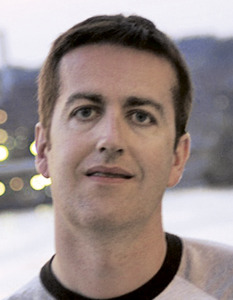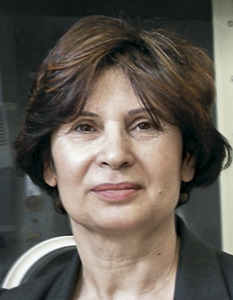Jerome P. Claverie
Guest Editor for this issue of MRS Bulletin
Université du Québec à Montréal, Département de Chimie, Montréal, Canada; email [email protected].

Claverie has been a professor of chemistry at the Université du Québec à Montréal since 2006. He obtained his PhD degree from the California Institute of Technology in 1996 with Professor R.H. Grubbs, and then became Chargé de Recherche in CNRS France. In 2002, he became an associate research professor at the University of New Hampshire. Claverie also is the director of the Québec Center for Functional Materials. His research group is interested in late transition metal catalysis for the preparation of novel polyolefins, as well as in the preparation of functional nanomaterials.
Frank Schaper
Guest Editor for this issue of MRS Bulletin
Université de Montréal, Département de Chimie, Montréal, Canada; tel. 514-340-5177, ext. 2572; and email [email protected].

Schaper is an associate professor at the Université de Montréal (UdeM). He studied metallocene-catalyzed olefin polymerization with Professor H.-H. Brintzinger in Germany, earning his PhD degree in 2002. After postdoctoral studies with Professor E.C. Constable (Basel, CH) and Professor R.F. Jordan (Chicago, USA, on polar olefin polymerization), Schaper started his independent research career at UdeM (2005). His research interests include synthetic and mechanistic inorganic chemistry, with a strong focus on the transition-metal catalyzed polymerization of cyclic esters.
Laura Boggioni
Istituto per lo Studio delle, Macromolecole (ISMAC), CNR, Via E. Bassini, 15, I-20133 Milano, Italy; tel. 39-02-23699348; and email [email protected].

Boggioni has been a researcher at the Istituto per lo Studio delle, Macromolecole (ISMAC-CNR) in Milano, Italy, since 2001. She received her Laurea in chemistry in 1994 from the University of Milano and her MS degree in polymer science in 1997 from Politecnico of Milano (Italy). In 1998, she received a Research Grant from CNR. In 2001, she became a researcher at ISMAC-CNR in Milano. Her interests focus on the synthesis and 13 C NMR microstructural analysis of homo-, co-, and ter-polymers of olefins and cycloolefins by using Ziegler-Natta type catalytic systems.
Vincenzo Busico
Dipartimento di Chimica “Paolo Corradini,” Università di Napoli Federico II, Complesso di Monte S. Angelo—Via Cintia, 80126 Napoli, Italy; tel. 39-081-674-355; and email [email protected].

Busico is a full professor of inorganic chemistry at the Federico II University of Naples. He obtained his PhD degree from the University of Naples under the supervision of Professor Corradini. After a postdoctoral fellowship at the Accademia Nazionale dei Lincei in Roma, he began his career at the Federico II University of Naples. Busico also has been the scientific chair of the Dutch Polymer Institute for the Polyolefin Technology Area since 2004. While interested in the domain of polyolefin science and technology and selective organometallic catalysis, his research has been focused on Ziegler-Natta, metallocene, and “post-metallocene” catalysts, microstructural analysis of polymers, molecular kinetics, discovery of stereoselective polymerization catalysts, high throughput experimentations, and advanced computational modeling of homogeneous and heterogeneous organometallic catalysts. He has published more than 150 scientific papers in peer-reviewed international journals and has eight international industrial patents.
Petar Doshev
Borealis Polyolefine GmbH, St. Peter-Str. 25, 4021 Linz, Austria; email [email protected].

Doshev has been with the Borealis Polyolefine GmbH research and development organization since 2005, focusing on product development and project management of research projects. He holds a PhD degree in the area of heterophasic polypropylene copolymers from Martin Luther University Halle–Wittenberg, Germany. Currently, he leads the Borealis core polypropylene research department, with responsibilities in polymer design and application development in the polypropylene product area. Doshev also is the inventor on more than 20 patents.
Markus Gahleitner
Borealis Polyolefine GmbH, St. Peter-Str. 25, 4021 Linz, Austria; tel. 43-732-6981-5914; and email [email protected].

Gahleitner joined the research and development organization of Borealis Polyolefine GmbH in Linz, Austria, in 1992, where he is active in various areas from product development to intellectual property rights. He studied chemical engineering at Johannes Kepler University, Linz, and completed his PhD degree thesis in the area of polymer melt rheology in 1990. He is the author of more than 50 publications in international, peer-reviewed journals, many publications in trade journals, and several book contributions, as well as more than 30 patents.
Max P. McDaniel
Chevron-Phillips Chemical Company, Phillips Research Center, Bartlesville, Okla., USA; tel. 918-661-9974; and email [email protected].

McDaniel has led a group of scientists in the study and derivation of polymerization catalysts at the Phillips Research Center in Bartlesville, Okla., for nearly four decades. He received his PhD degree in physical chemistry in 1974 from Northwestern University, where he studied the porosity and redox capacity of chromia catalysts under Professor Robert L. Burwell. In 1974, McDaniel spent one year at the Institute of Catalysis in Lyon, France, as a Chercheur Associé, under Professor S.J. Teichner. McDaniel joined Phillips Petroleum Company in 1975 to work on Cr/silica catalysts under J. Paul Hogan. McDaniel is the recipient of several ACS and other awards, he has authored more than 100 scientific publications and lectures and more than 350 US patents. His contributions include advancements in Phillips Cr/silica catalysts, metallocene activation, ethylene trimerization, and high-performance blow molding, pipe, sheet, and film resins.
Luigi Resconi
Borealis Polyolefine GmbH, St.-Peter-Str. 25, 4021 Linz, Austria; tel. 43-732-6981-5707; and email [email protected].

Resconi has been with the research and development organization of Borealis Polyolefine GmbH in Linz, Austria, since 2008. He obtained his doctor in chemistry degree from the University of Milano in 1984 with a thesis on metal carbonyl clusters. After a scholarship at the ETH-Zürich with Piero Pino, he joined the Ziegler-Natta research group at the Corporate Research Center of Montedison in Novara, Italy. Throughout 1989, Resconi was a visiting scientist at Stanford University in the group of Robert Waymouth, where he studied the cyclopolymerization of 1,5-hexadiene. Since 1990, he has been involved in the development of metallocene catalysts for different polyolefin processes, work that has generated more than 100 patent applications and approximately 90 scientific publications.
Bernhard Rieger
WACKER-Lehrstuhl für Makromolekulare Chemie, Technische Universität München, Lichtenbergstr. 4, 85748 Garching b. München, Germany; tel. 49-89-289-13571; and email [email protected].

Rieger has been a professor at the Technische Universität München in the WACKER-Lehrstuhl für Makromolekulare Chemie and director of the Institute of Silicon Chemistry since 2006. He studied chemistry at the Ludwig-Maximilians-Universität München and received his PhD degree in 1988. After research at the University of Massachusetts at Amherst and in the plastics laboratory of BASF SE, he received his Habilitation in 1995 at the University of Tübingen. In 1996, Rieger became a professor in the Materials and Catalysis Department at the University of Ulm. In addition, he has received a teaching award from the Federal State of Baden–Württemberg and the Philip-Morris Award.
Daisuke Takeuchi
Chemical Resources Laboratory, Tokyo Institute of Technology, R1–04, 4259 Nagatsuta, Yokohama, Japan; tel. 81-45-924-5231; and email [email protected].

Takeuchi is an associate professor at the Tokyo Institute of Technology. He received his MEng degree from the University of Tokyo in 1996. In 1998, he joined the Tokyo Institute of Technology as a research associate, where he received his PhD degree (2000). Takeuchi was promoted to assistant professor in 2000 and associate professor in 2006. His research interests include the design and synthesis of new polymerization catalysts and new monomers.
Incoronata Tritto
Istituto per lo Studio delle, Macromolecole, CNR, Via E. Bassini, 15, I-20133 Milano, Italy; tel. 39-02-23699370; and email [email protected].

Tritto is director of the Istituto per lo Studio delle, Macromolecole, CNR, in Italy. She received her master’s degree in polymer science at the Specialization School “Giulio Natta” (Politecnico of Milano) in 1981. She joined the Institute for Macromolecular Chemistry of CNR in 1982. In 1988, Tritto joined the group of Robert Grubbs at the California Institute of Technology. Her research interests include stereospecific olefin and cyclic olefin homo- and copolymers by transition metal catalysts; the study of homogeneous catalytic systems by in situ NMR analysis; and block copolymers and nanostructured hybrid polymers.
Sergei I. Vagin
WACKER-Lehrstuhl für Makromolekulare Chemie, Technische Universität München, Lichtenbergstr. 4, D-85748 Garching b. München, Germany; tel. 49-089-289-13568; and email [email protected].

Vagin has been a member of Professor B. Rieger’s research group at WACKER-Lehrstuhl für Makromolekulare Chemie, Technische Universität München since 2006. He received his PhD degree at the Ivanovo State University of Chemistry and Technology, Russia, in 2000. In 2001, he continued his research on phthalocyanines and related compounds by joining the group of Professor M. Hanack at Tübingen University, Germany. With his current research, Vagin carries out investigations in the field of polymeric materials and catalysis.
Philip C. Zehetmaier
WACKER-Lehrstuhl für Makromolekulare Chemie, Technische Universität München, Lichtenbergstr. 4, D-85748 Garching b. München, Germany; tel. 49-089-289-13566; and email [email protected].

Zehetmaier is a member of Professor B. Rieger’s research group at WACKER-Lehrstuhl für Makromolekulare Chemie, Technische Universität München (TUM). He studied chemistry at TUM and received his diploma in 2009 at the WACKER-Chair for Macromolecular Chemistry, focusing on novel polysiloxane-based copolymers as thermoplastic elastomers. His areas of interest include supporting single-site polymerization catalysts on silica gel and the application of those systems in gas phase polymerizations.


